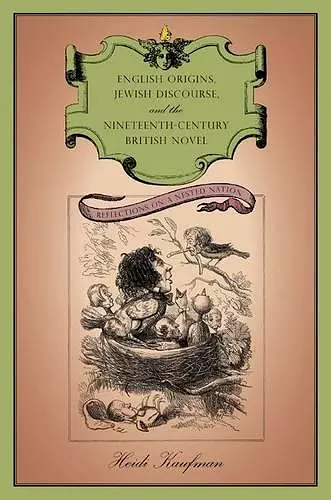English Origins, Jewish Discourse, and the Nineteenth-Century British Novel
Reflections on a Nested Nation
Format:Hardback
Publisher:Pennsylvania State University Press
Published:10th Sep '09
Currently unavailable, and unfortunately no date known when it will be back

English Origins, Jewish Discourse, and the Nineteenth-Century British Novel examines the intersection of religion, racial discourse, and national identity in nineteenth-century British novels.
Examines the embedding of Jewish history and culture in depictions of English racial and national identity in nineteenth-century novels.
“For we rather forget that the Christian God was a Jew,” Patrick Braybrooke facetiously claimed, “though no doubt this was a Divine mistake and the ‘nationality’ of Christ should have been English.” Taking Braybrooke’s lead, Heidi Kaufman argues that the proliferation of Jewish discourse in nineteenth-century British novels was linked to the construction of English character and English origins. The period of the eighteenth century marks a turning point in definitions of English national identity, not only because of a rise in modern racial thinking, but also because of the contradictory dimensions of Englishness that called out for resolution in novels. This study looks at some of the ways in which novels of the nineteenth century began to rewrite Jewish and Christian theological affiliations in an effort to allay the racial panic such associations posed for the nation’s newly emergent racial-religious identity. Novels were uniquely well suited to this task because of their emphasis on sequential history and character development, their increasing popularity, and their imaginative possibilities. Kaufman shows that nineteenth-century novels did not simply engender ideas about England and the English but also attempted to correct a problem that arose when the racial and theological components of national identity came into conflict with one another.
“Offers an interesting critical lens through which to view nineteenth-century fiction: Jewish discourse.”
—Judith Page, University of Florida
“If you’re English then you’re Jewish. At least, as Heidi Kaufman demonstrates in English Origins, Jewish Discourse, and the Nineteenth-Century British Novel, that’s what many major Victorian novelists thought. Victorian writers, she argues, incorporated Jewishness into the very heart of English national identity. Writers like Edgeworth, Tonna, Dickens, Disraeli, Bronte, Eliot, and Haggard depicted their Christian characters as metaphorical Jews: as Wandering Jews progressing toward but never quite reaching an English ideal, as crusading prototypes of British imperial ventures in the Holy Land, as transmitters of a Bible-centered culture that had to but couldn’t be transcended, as the ambiguous symbols of English capitalism, as an alien yet ‘nested nation.’ Kaufman argues that Jewish discourse in the Victorian novel unsettled easy distinctions between the Orient and Occident, race and religion, anti- and philo-Semitism, the Old Testament and the New. She calls into question one of the key premises of recent criticism—that Victorians were bent on converting away the Jewish parts in themselves.”
—Michael Galchinsky, Georgia State University
“Heidi Kaufman has written a useful and consistently interesting book. She examines many of the complex ways that ‘Jewish discourse’ is imbricated in nineteenth-century British fiction and culture. In doing so, she critiques Edward Said’s Orientalism for its overly binaristic approach to Western depictions of the East. . . . In her conclusion, Kaufman notes that antisemitism was at least correct in accusing Jews and Judaism of influencing British culture and politics. The novelists she examines give ‘Jewish discourse,’ as she calls it, a major role in their understandings of Christianity and of contemporary English identities. She ably demonstrates that ‘Jewish discourse’ both mediates and problematizes the many religious and racial categories through which Victorian writers and intellectuals made sense of themselves and their world.”
—Patrick Brantlinger Shofar
“If critics typically identify Fagin, Deronda, and Svengali as cultural others in the normalizing worlds of fiction, Heidi Kaufman’s recent book looks beyond the most obvious literal depictions and offers a new perspective that challenges insider/outsider binaries.”
—Emily Steinlight Modern Philology
ISBN: 9780271035260
Dimensions: 229mm x 152mm x 24mm
Weight: 513g
256 pages